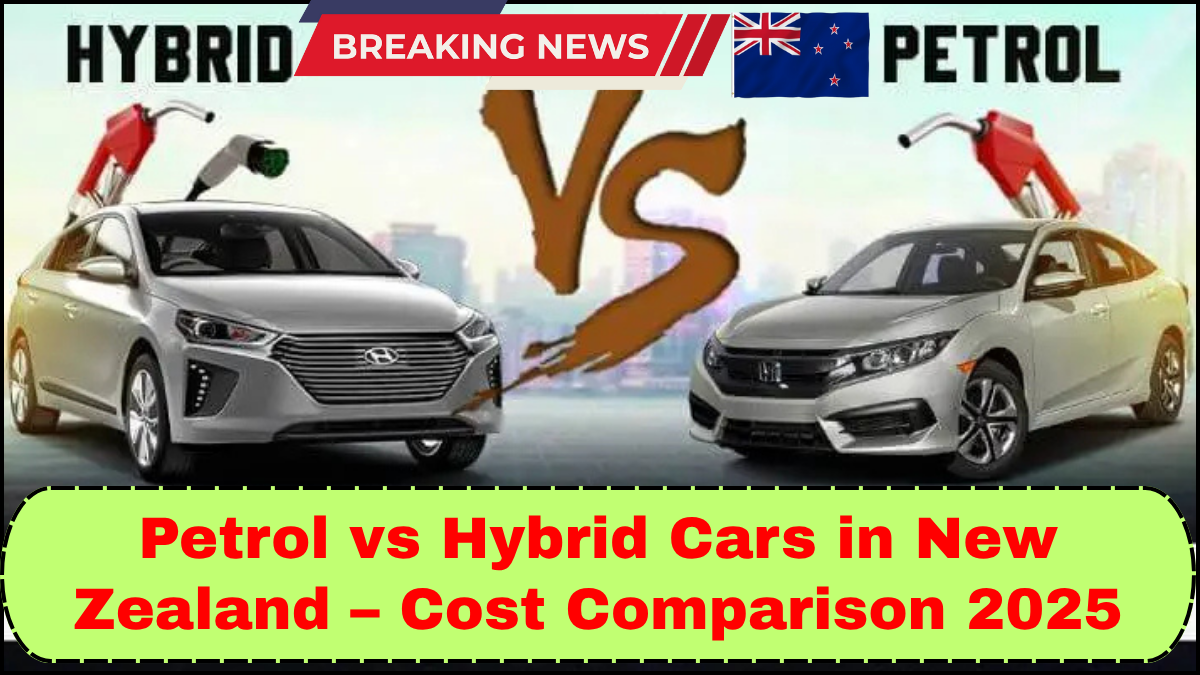As fuel prices continue to fluctuate and environmental concerns rise, Kiwi drivers are reassessing their vehicle choices. The battle between traditional petrol-powered cars and hybrid vehicles is gaining momentum. In 2025, the cost landscape for owning and operating a car in New Zealand has shifted significantly. This article breaks down the true costs and considerations of Petrol vs Hybrid Car Costs NZ 2025, helping you make an informed decision.

Upfront Purchase Price: Petrol vs Hybrid
One of the first factors buyers notice is the initial cost. Petrol cars are generally cheaper off the lot. A compact petrol car in New Zealand in 2025 starts around NZD $20,000. In contrast, a comparable hybrid model may begin at NZD $27,000 or higher.
That said, the price gap is narrowing. Government incentives, such as Clean Car rebates, make hybrids more accessible. Some models can qualify for rebates of up to NZD $3,000, partially offsetting the higher sticker price.
Fuel Cost NZ: Which Vehicle Saves More at the Pump?
Fuel prices in New Zealand remain high in 2025, with petrol averaging around NZD $2.85 per litre. This makes fuel cost NZ a critical component of overall vehicle ownership.
- Petrol Car: A typical petrol car consumes about 7.5 litres per 100km. At 15,000 km per year, annual fuel costs could reach around NZD $3,206.
- Hybrid Car: Most hybrids use closer to 4.0 litres per 100km, cutting that annual fuel bill to approximately NZD $1,710.
Over five years, this adds up to nearly NZD $7,500 in fuel savings with a hybrid vehicle.
Maintenance and Servicing
When it comes to ongoing maintenance, petrol vehicles have simpler engines, which can mean cheaper service costs in the short term. However, they may require more frequent servicing due to wear and tear.
Hybrid cars, while featuring more complex systems, benefit from regenerative braking (reducing brake wear) and fewer oil changes. Battery concerns are often overblown, as most hybrids come with warranties of 8 to 10 years. In 2025, hybrid servicing packages are more common, reducing long-term ownership stress.
Depreciation and Resale Value
Hybrids used to struggle with resale value, but not anymore. In 2025, the demand for fuel-efficient and low-emission vehicles boosts the long-term value of hybrids. While petrol vehicles still depreciate more slowly in the first two years, hybrids tend to retain better value after year three.
For example:
- Petrol Car: May lose 50% of its value in five years.
- Hybrid Car: Likely to retain 60-65% of its original value in the same period.
Environmental and Regulatory Considerations
Although not purely financial, environmental impact and future regulatory changes factor into vehicle choice. Cities like Auckland and Wellington are exploring congestion charges and low-emission zones. Hybrid owners may benefit from exemptions or reduced fees.
With New Zealand’s Zero Carbon Act aiming to cut emissions drastically by 2050, petrol vehicle ownership could become more costly due to taxes or fuel levies.
Hybrid Comparison: Which Model Fits Best?
Hybrids are no longer just sedans. In 2025, buyers can choose from SUVs, hatchbacks, and even utes with hybrid technology. Popular hybrid models in NZ include the Toyota Corolla Hybrid, Honda Jazz e:HEV, and RAV4 Hybrid.
Bottom Line: Is a Hybrid Worth It?
If your priority is long-term savings and lower environmental impact, hybrids are the smarter choice in 2025. Despite a higher upfront cost, the reduced fuel cost NZ, lower maintenance, and better resale value make hybrids increasingly competitive.
For those driving mostly short distances or in rural areas where fuel prices are unpredictable, a petrol car might still be viable. But for urban commuters, the hybrid comparison clearly favors fuel-efficient technology.
FAQs
Q1: Are hybrids more expensive to insure in NZ?
A: Not significantly. Insurance premiums for hybrids may be slightly higher due to the value of the vehicle, but many providers offer discounts for eco-friendly cars.
Q2: What happens if the hybrid battery fails?
A: Modern hybrid batteries are reliable and often covered under warranty for 8-10 years. Replacement costs have also decreased significantly.
Q3: Can hybrids be serviced anywhere in NZ?
A: Yes, most major service centers now have hybrid-certified mechanics.
Q4: Are there tax incentives for hybrid vehicles in NZ in 2025?
A: Yes. As of 2025, the Clean Car Discount still applies, offering rebates for low-emission vehicles including hybrids.
Q5: Which hybrid has the best fuel economy in NZ?
A: The Toyota Prius and Honda Jazz e:HEV consistently rank among the top performers in terms of fuel efficiency.
click here to learn more